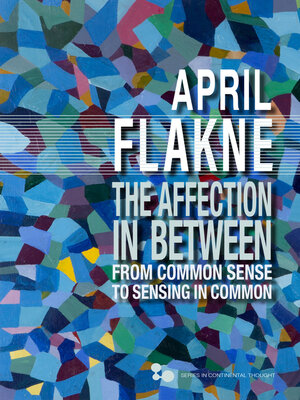The Affection in Between
ebook ∣ From Common Sense to Sensing in Common · Series in Continental Thought
By April Flakne

Sign up to save your library
With an OverDrive account, you can save your favorite libraries for at-a-glance information about availability. Find out more about OverDrive accounts.
Find this title in Libby, the library reading app by OverDrive.



Search for a digital library with this title
Title found at these libraries:
| Library Name | Distance |
|---|---|
| Loading... |
Exposing a fundamental but forgotten capacity to sense with others, this fresh approach to ethics centers on expressive, moving bodies in everyday affective encounters.
Common sense has yet to yield its golden promise: robust selves, a stable sense of reality, and bonds of solidarity. The Affection in Between argues that reimagining common sense involves tackling two intractable philosophical puzzles together: the problems of sensory integration and of "other minds." Construing common sense as either an individual cognitive capacity or a communal body of beliefs and practices, as our tradition of philosophical and political thought has done for too long, constricts possibilities of self and other, ethics and politics. Neither register alone can evade political manipulation and deliver common ground between confident yet unavoidably porous selves.
April Flakne begins with a novel interpretation of the neglected Aristotelian concept of sunaisthesis, an embodied, interactive capacity to create overlapping meaning through the cultivation of a sensibility that is neither individual nor communal but unfolds between bodies in movement. Bolstering Aristotle's concept with classical and contemporary phenomenology, including critical phenomenology, empirical theories of social cognition, and affect theory, Flakne offers fresh answers to a pressing and legitimate skepticism about selfhood and the role that ethics might play in countering disorientation and manufactured division. Through an exploration of the intimate experiences of birth, death, caregiving, and mourning, Flakne brings the ethical and political aspects of interembodied interaction home and into lived experience.







